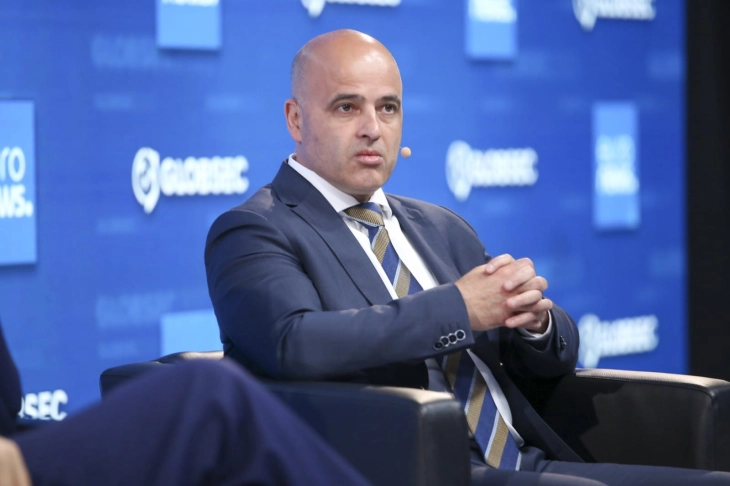Kovachevski: EU must have a clear strategy over integration of remaining part of Balkans
- There was no country which had to make harder decisions than North Macedonia. North Macedonia changed its name to become a NATO and EU member. And when the referendum was finished, when Parliament voted for it, NATO delivered, the EU did not, said Prime Minister Dimitar Kovachevski on Wednesday at the “Open Roads: Balkans Back in Business” panel at the GLOBSEC 2023 Forum in Bratislava.
- Post By Angel Dimoski
- 14:20, 31 May, 2023

Bratislava, 30 May 2023 (MIA) – There was no country which had to make harder decisions than North Macedonia. North Macedonia changed its name to become a NATO and EU member. And when the referendum was finished, when Parliament voted for it, NATO delivered, the EU did not, said Prime Minister Dimitar Kovachevski on Wednesday at the “Open Roads: Balkans Back in Business” panel at the GLOBSEC 2023 Forum in Bratislava.
“These are the facts. Because they invented some veto there because of the rule of law and other things. We started our independence as a country 32 years ago as part of a former bigger country. Building institutions, creating institutions from scratch. A big part of these institutions were built together with EU and U.S. support. So, they really have high institutional capabilities” said Kovachevski.
The PM said, according to MIA’s special reporter from Bratislava, when we talk about integrity, rule of law and democracy, it seems as the Copenhagen criteria are forgotten.

"Do you think all the countries that joined the EU were up on the level of France, Germany and Sweden? I would not agree. I would even say that the integrity of the Macedonian Parliament in terms of compliance with anticorruption is much better than that of the European Parliament," said the PM.
Kovachevski reminded that the country has carried out difficult reforms, which is why the EU, and above all the European Council, must have a clear strategy for the integration of the remaining part of the Balkans that is not a part of the Union.
According to the PM, this year’s GLOBSEC Forum in Bratislava is being held at a time when Europe, and the Balkans, are facing many challenges, which is why it is important to create the conditions for cooperation and encouraging economic growth in the countries of the region.

The PM also stressed the role of the European Union in the economic prosperity of the Western Balkans and ways to find international partnerships, saying that sometimes it’s better to heat the opinions of the countries of Southeast Europe when it comes to issues in the interest of the EU, instead of just stigmatizing the Balkans.
Regarding the question of the panelist regarding the gap between the Balkan states who are a part of the EU and those who are not, Kovachevski said it is increasing in an economic sense and that this isn’t good, which is why the support of EU funds is key for the development of Balkan countries, while EU membership is the only path for their progress.

“When the gap is increased, then it means the gaps in education, infrastructure, transportation,, and the gap in institutional efficiency are increasing as well,” added Kovachevski.
On whether the current EU approach is the proper approach and whether it is a substitute for enlargement, the PM said that after the war in Ukraine, the EU has realized the strategic mistake it made a few years ago when North Macedonia and Albania were vetoed.
“When you make a strategic mistake you cannot solve it in five minutes because strategic mistakes have effects that last at least for a period of 5–10 years. I know that the President of the European Commission is a great friend of our countries and a great personal friend which helped in the most challenging years, during the crises – pandemic, war, energy crisis, economic crisis, and the help we received was needed at that time,” said Kovachevski.

The PM stressed that in parallel with the EU support, the countries of the region are working together in order to tackle the crisis and, together, managed to get through the previous winter better than they had hoped.
According to Kovachevski, the East European countries that are EU members are strong economically because they joined the Union.
“They are better economically, only because they are members of the EU. So, the way forward for the Western Balkans is membership in the EU. Whether it will come immediately or by sectors, this is a matter of execution,” added Kovachevski.
The PM said that currently in Europe there are several crises that have to be tackled, such as the war in Ukraine, which has an exceptionally negative effect on inflation, the lack of energy sources and underlined the need for financing new infrastructure.

“The war in Ukraine made two paradoxes, and no one is talking about these two paradoxes. The next winter will come again. The infrastructure which was built for decades from East to West is practically non-functional. The Western European economists were partly built on cheap Russian gas, which is now not existing in the needed quantities. This is paradox number one, they don’t exist anymore. Paradox number two is that Russia will now have to build new infrastructure to the East, to sell to China, India,” said Kovachevski.
In such a situation, according to the PM, Europe will have to finance new infrastructure from the South to the North.
“How does the EU plan to secure this infrastructure, and here I am talking about LNG terminals, part of them will be in Albania. I am talking about gas pipelines, for crude oil, oil derivatives – they will all go through North Macedonia and Serbia. This region has to be part of the EU,” said Prime Minister Kovachevski.
Photo: Government







